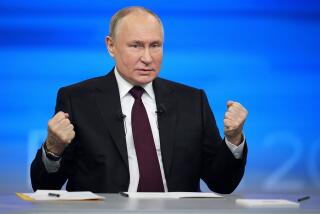Yeltsin Criticizes Divide Between Rich and Poor : Russia: Leader attacks bureaucrats, corrupt factory chiefs. He reiterates vow to combat crime.
- Share via
MOSCOW — Sounding like the fiery crusader of old, Russian President Boris N. Yeltsin lashed out Wednesday at fat-cat bureaucrats who behave like “nobility” and factory directors who live “like Russian sheiks” while failing to pay their workers for months on end.
In a rare interview published Wednesday, Yeltsin bemoaned the growing divide between rich and poor in this formerly egalitarian society. He suggested that taxing the nouveaux riches might help close the gap.
Yeltsin said that inflation, now running at 6% a month, should be down to 2% or 3% per month by the end of 1995. And he insisted that Russia needs to pursue the crackdown on crime that he ordered, despite criticisms that it violates human rights and the Russian constitution.
Russian public opinion seems squarely behind the president on this issue. The perception that crime is out of control was reinforced this week when the newspaper Komsomolskaya Pravda reported that twice as many Russians were killed in gang wars last year than during the nine-year Soviet war in Afghanistan.
Flexing the more muscular foreign policy that has kept his nationalist critics at bay--but disconcerts his Western allies--Yeltsin promised that 1994 would bring “a breakthrough in Russia’s status in the world.”
“Now we are not just listening,” he said. “We are actively formulating proposals, conditions and demands. This is a brand-new situation.”
The 63-year-old Siberian has not been seen in public since the Naples, Italy, summit of leaders of the world’s most powerful economies. Yeltsin missed two days of work because of what aides called a minor flu. But he was reported back at work in the Kremlin on Wednesday, and sent out feisty written answers to questions submitted by the Interfax news service.
In vintage Yeltsin style, the president lambasted his own government for its failures, flayed those who are living high while their countrymen suffer through 2 1/2 years of painful economic transformation, raged that his orders were not being implemented--and was tantalizingly short on details about how he plans to change all this.
In fact, Yeltsin, whose aides have been hinting that he may run for reelection, sounded a lot like a presidential candidate, an outsider attacking a government that has become arrogant and indifferent to the mistreatment of its citizens.
Yeltsin said the Kremlin has been tracking 109 Russian enterprises that are not paying their workers or debts to suppliers--a chronic problem in Russia that has created financial gridlock and paralyzed the economy. Yeltsin said the problem is not that factories are broke but that they are misusing funds.
“The picture in many of them is simply disgusting,” he said. “Workers have not been paid in three or four months. The directors cry, ‘Give us money!’ And at the very same time, millions of dollars are being held in hard-currency bank accounts, invested in dubious enterprises and private companies.
“The money is being spent on some unthinkable luxuries for the managers” who drive expensive cars and pay themselves salaries of up to $5,400 a month, a sum that seems obscene in a nation where the average monthly salary is less than $100, Yeltsin said, noting, “Some of these directors are turning into Russian sheiks at state expense.”
Some officials who used to act like democrats now imagine themselves as “a special noble class, completely cut off from the sinful Earth.”
Such delicious rhetoric is reminiscent of the Politburo-bashing that brought Yeltsin such popularity in the late 1980s. But other than calling for a general crackdown, the president did not say how he would curb his minions’ appetites for the perquisites of post-Soviet power.
The interview was also silent on another touchy subject: the talks with Estonia over a Russian troop pullout. In Naples, Yeltsin upstaged President Clinton by announcing his troops would not pull out of Estonia by Aug. 31 as promised because of “gross violations of human rights” of Russian speakers living there.
But Yeltsin promised Clinton he would meet with Estonian President Lennart Meri, and ace Russian negotiator Vitaly S. Churkin, a deputy foreign minister, was dispatched to Helsinki, Finland, to try to negotiate a deal for withdrawing the 2,000 Russian troops.
On Wednesday the talks ended in an apparent stalemate. Russia is demanding social guarantees for retired Red Army officers who wish to remain in Estonia, while the Baltic nation sees them as a potential “fifth column” that has been demobilized on its territory.
More to Read
Sign up for Essential California
The most important California stories and recommendations in your inbox every morning.
You may occasionally receive promotional content from the Los Angeles Times.













